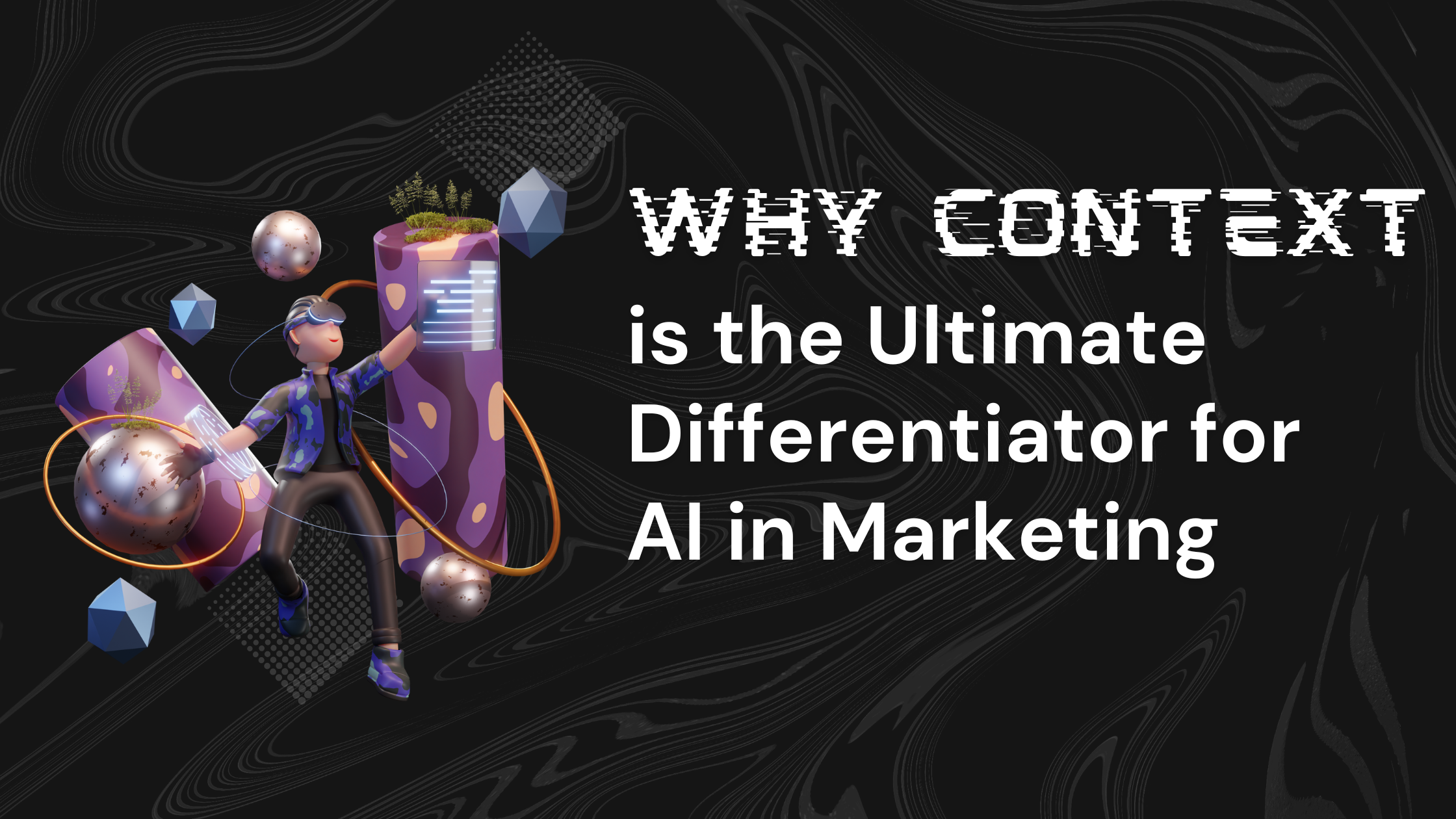
The marketing world is abuzz with AI. From generating ad copy to optimizing campaigns, artificial intelligence is rapidly becoming indispensable.1 But as AI tools proliferate and their basic capabilities become commoditized, a crucial question arises: what will truly differentiate the most effective AI in marketing? The answer lies not just in raw processing power or complex algorithms, but in the mastery of context.
In a world saturated with information, where consumers are bombarded by messages, generic AI-driven marketing falls flat. The true power of AI in marketing emerges when it deeply understands the who, what, where, when, why, and how of every interaction. Without context, AI is merely a powerful calculator; with it, it transforms into an indispensable strategic partner.
Here's why context is the ultimate differentiator for AI in marketing:
1. Moving Beyond Generic to Hyper-Personalization2
Basic AI can segment audiences and send automated messages.3 But imagine an AI that understands:
- Individual Purchase History (and intent): Not just what they bought, but why they bought it, their typical buying cycle, and what complementary products they might need next.
- Real-time Behavioral Cues: An AI that notices a user lingering on a specific product page, then immediately Browse reviews, and then adding an item to their cart – responding in that moment with a personalized offer or helpful information.
- Omnichannel Journey: An AI that understands whether a customer has just spoken to customer service, visited a physical store, or clicked on an ad on social media, ensuring continuity and avoiding repetitive or irrelevant messaging.
This level of contextual understanding moves beyond mere personalization to hyper-personalization, making every interaction feel genuinely tailored and relevant, dramatically increasing engagement and conversion rates.4
2. Crafting Truly Relevant and Engaging Content
AI can generate text, but without context, it often produces bland, uninspired, or even off-topic content.5 Contextual AI, however, can:
- Understand Brand Voice and Tone: It can internalize a brand's unique personality and ensure all generated content aligns perfectly, whether it's witty, authoritative, or empathetic.
- Grasp Audience Nuances: It learns the specific language, pain points, and aspirations of different audience segments, tailoring content that truly resonates.6
- Incorporate Real-World Events: An AI aware of current events, cultural trends, or even local weather patterns (e.g., promoting hot coffee on a cold, rainy day) can create timely and highly relevant messages that capture attention. For instance, an AI agent aware that it's currently June 21, 2025, and sunny in Jhenaidah, Bangladesh, wouldn't suggest heavy winter wear.
This contextual awareness elevates AI-generated content from functional to truly compelling, driving stronger emotional connections with the audience.7
3. Optimizing Campaigns with Unprecedented Precision
AI excels at optimizing campaigns, but context supercharges this capability:
- Attribution Beyond the Last Click: A contextual AI understands the entire customer journey, crediting various touchpoints (ads, content, social media, word-of-mouth) appropriately, rather than just focusing on the last click.8 This allows for more intelligent budget allocation.
- Predictive Analytics with Depth: It doesn't just predict what will happen, but why it will happen, factoring in external market conditions, competitive moves, and even internal business changes.
- Dynamic Resource Allocation: An AI that understands the real-time context of market demand, inventory levels, and competitor activity can dynamically shift ad spend, pause underperforming campaigns, or push new promotions with unparalleled agility.9
This contextual intelligence transforms campaign optimization from a reactive process into a proactive, highly strategic function.
4. Building Authentic Customer Relationships
Marketing is ultimately about building relationships.10 Generic AI can automate interactions, but contextual AI can foster genuine connection:
- Empathy in Interactions: By understanding the emotional tone of customer inquiries (e.g., frustration, excitement), an AI can tailor its responses to be more empathetic and helpful, even escalating to a human when necessary.11
- Proactive Problem Solving: An AI that notices a customer repeatedly encountering an issue with a product or service can proactively offer solutions or support, before the customer even complains.
- Understanding Lifetime Value: It recognizes that not all customers are equal, and dedicates resources and personalization efforts based on a customer's potential long-term value, rather than just their last transaction.
This deeper, contextual understanding helps build trust and loyalty, turning transactional interactions into lasting relationships.12
The Future: Contextual Intelligence as a Competitive Edge
As AI capabilities become more widespread, the true competitive advantage will belong to marketers who can leverage AI to understand and act on context. This means:
- Investing in Robust Data Infrastructure: Contextual AI thrives on clean, integrated, and comprehensive data from across the organization and beyond.13
- Prioritizing Data Governance and Ethics: Ensuring data is collected and used responsibly, maintaining customer trust.14
- Fostering Cross-Functional Collaboration: Breaking down silos to create a unified customer view that feeds the AI's understanding.15
- Empowering AI with Business Understanding: Giving AI systems access to business rules, objectives, and brand guidelines to inform its decision-making.
In the evolving AI landscape, context is no longer a luxury; it's a necessity. It’s the secret sauce that transforms AI from a powerful tool into the ultimate differentiator, enabling marketers to connect with audiences on a deeper, more meaningful level and drive unparalleled business results.